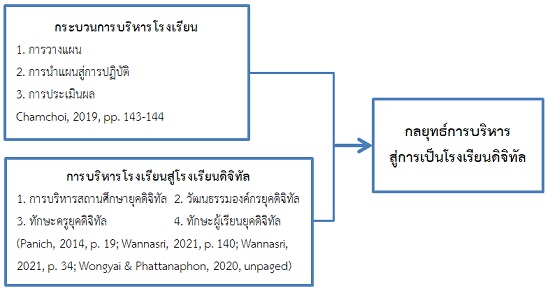ADMINISTRATIVE STRATEGY FOR BECOMING A DIGITAL SCHOOL
DOI:
https://doi.org/10.14456/nrru-rdi.2023.15Keywords:
Strategy, School administration, Digital schoolAbstract
The purpose of this research was to study the need of an administration towards a digital school and to develop strategies of becoming a digital school management. The instruments used were determined a sample size and experts by applying Taro Yamane Formula as 326 people. Stratified random sampling method was used with a reliable questionnaire of the present condition equal to 0.84 and the desirable condition equal to 0.86. Simple random sampling method was used for 40 people of the expert group who were the sample. A probability and appropriation assessment which had an item consistency index greater than 0.50 by collecting both postal data. Data were analyzed using a statistic analysis of percentage, mean, and standard deviation. And to find a difference between the present condition and the desirable condition. The study suggested 7 needs that could be developed to the administrative strategy for becoming the most appropriation and the most feasibility of a digital school. The results of the study were as follows: 3 primary strategies ( =4.89 (appropriation), 4.85(feasibility)), 13 secondary strategies (
=4.89(appropriation), 4.83(feasibility)), and 49 procedures (
=4.89(appropriation), 4.83(feasibility)) that could be applied to a guideline for school administration for becoming a potential digital school.
References
Adepoju, O. O., & Nwulu, N. (2020). Engineering Students’ Innovation Competence: A Comparative Analysis of Nigeria and South Africa. International Journal of Engineering Pedagogy (iJEP), 10(6), 147–155. https://doi.org/10.3991/ijep.v10i6.14695
Agustini, D., Lian, B., & Sari, A. P. (2020). School’s strategy for teacher’s professionalism through digital literacy in the industrial revolution 4.0. International Journal of Educational Review, 2(2), 160-173. https://doi.org/10.33369/ijer.v2i2.10967
Best, J. W. (1997). Research in Education (3rd ed.). Englewood Cliffs, New Jersey : Prenitice Hall.
Chamchoi, S. (2019). School Management in the Digital Age. School Management in Digital Age (2nd ed.). Bangkok : Chulalongkorn University Press. (In Thai)
Cronbach, L. J. (1990). Essentials of Psychological Testing (5th ed.). New York : Harper Collins.
Demir, F., Kim, S. M., Current, N., & Jahnke, I. (2019). Strategic improvement planning in schools: A sociotechnical approach for understanding current practices and design recommendations. Management in Education, 33(4), 166-180. https://doi.org/10.1177/0892020619847681
Education Management Information System. (2020). Number of schools under the Nakhon Ratchasima Educational Service Area Office 1-7. Retrieved November 13, 2021, from https://data.bopp-obec.info/emis/school_edu_p.php?province=19 (In Thai)
Frolova, E. V., Ryabova, T. M., & Rogach, O. V. (2019). Digital Technologies in Education: Problems and Prospects for" Moscow Electronic School" Project Implementation. European Journal of Contemporary Education, 8(4), 779-789.
Intaramanee, S. (2019). The administration of educational institutions in the digital age. UMT Poly Journal, 16(1), 353-360. (In Thai)
Karakose, T., Polat, H., & Papadakis, S. (2021). Examining teachers’ perspectives on school principals’ digital leadership roles and technology capabilities during the COVID-19 pandemic. Sustainability, 13(23), 13448. https://doi.org/10.3390/su132313448
Keesukphan, E. (2020). Administration of educational institutions in the digital age. Retrieved on November 16, 2021, from http://www.trueplookpanya.com (In Thai)
Mikhamthong, P. (2016). Analysis of educational environment by SWOT analysis. Khon Kaen : Klungnanwittaya. (In Thai)
Ministry of Education. (2013). National Education Act 1999, Amendment No. 2 B.E. 2545 and No. 3, 2010. Bangkok : The Teacher Coucil of Ladprao Printing House. (In Thai)
Mohamed Hashim, M. A., Tlemsani, I., & Matthews, R. (2022). Higher education strategy in digital transformation. Education and Information Technologies, 27, 3171-3195. https://doi.org/10.1007/s10639-021-10739-1
Mulcahy, D. E. (2019). The role of the school principal in educational reform. International Journal of Educational Reform, 28(2), 151-161.
Panich, W. (2014). Creating Learning for the 21st Century (2nd ed.). Bangkok : Sor Charoen Publishing. (In Thai)
Papadakis, S., Vaiopoulou, J., Kalogiannakis, M., & Stamovlasis, D. (2020). Developing and exploring an evaluation tool for educational apps (ETEA) targeting kindergarten children. Sustainability, 12(10), 4201. https://doi.org/10.3390/su12104201
Phokham, T. (2020). Model of public school administration in the digital age. Under the Office of the Basic Education Commission. The Journal of Research and Academics, 4(1), 177-188. (In Thai)
Riahi, S., & Riahi, A. (2018). The Pedagogy of Higher Education: How to Evaluate the Quality of Training in Morocco to Improve it. International Journal of Engineering Pedagogy (iJEP), 8(1), 92–108. https://doi.org/10.3991/ijep.v8i1.7984
Runcharoen, T. (2017). Education and learning in the digital age. Nakhon Ratchasima : Vongchavalitkul University. (In Thai)
Tohara, A. J. T. (2021). Exploring digital literacy strategies for students with special educational needs in the digital age. Turkish Journal of Computer and Mathematics Education (TURCOMAT), 12(9), 3345-3358. https://doi.org/10.17762/turcomat.v12i9.5741
Wannasri, J. (2021). Educational Administration in the Digital Age. Bangkok : Rattanasuwan Printing. (In Thai)
Wongwanich, S. (2019). Needs Assessment Research (4th ed.). Bangkok : Chulalongkorn University Press. (In Thai)
Wongyai, W., & Pattaphol, M. (2020). A new paradigm in the learning platform. Bangkok : Graduate School Srinakharinwirot University. (In Thai)
Yamane, T. (1967). Statistics, An Introductory Analysis (2nd ed.). New York : Harper and Row.

Downloads
Published
How to Cite
Issue
Section
License

This work is licensed under a Creative Commons Attribution-NonCommercial-NoDerivatives 4.0 International License.




